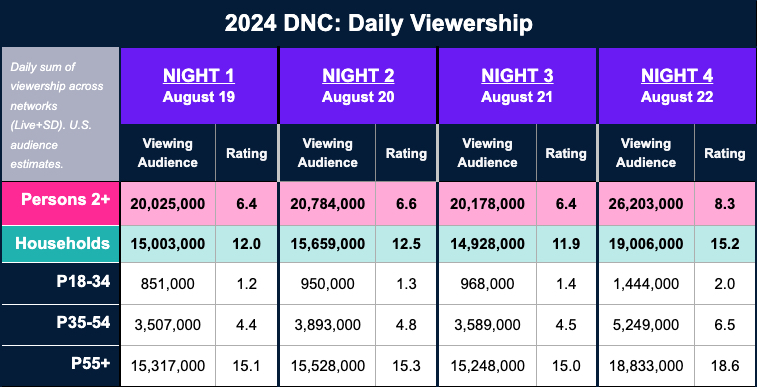Why Is WBD Paying $8.5 Billion For a Physical Studio ... While It's $38 Billion in Debt and AI Production Is Dawning?
Also in this week's 'Next Text,' we break down Kamala Harris' Bigger DNC crowd sizes, and we look at how the Venu Sports guys really messed up
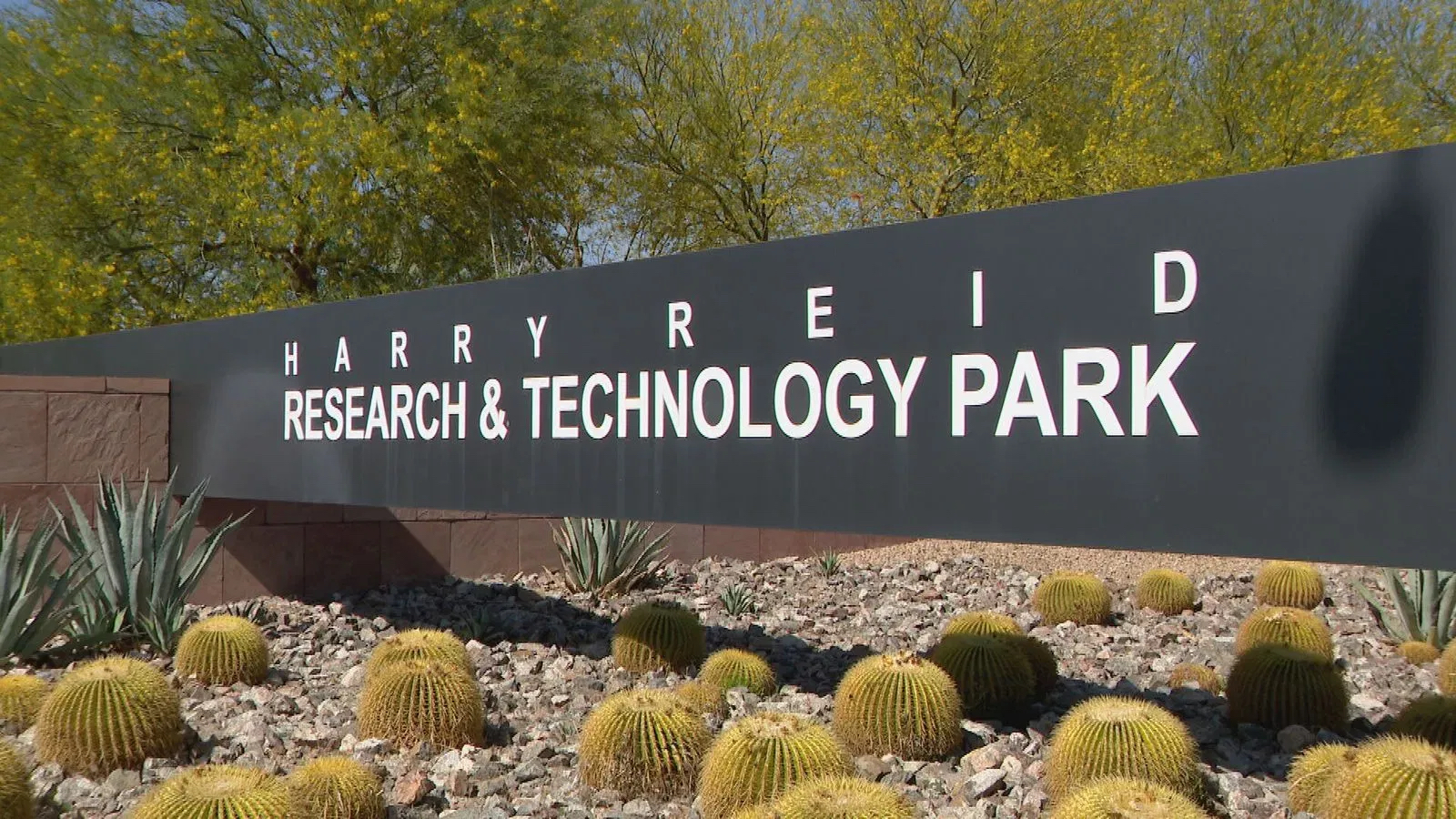
The smarter way to stay on top of the streaming and OTT industry. Sign up below.
You are now subscribed
Your newsletter sign-up was successful
Every Sunday -- almost, anyway -- Daniel Frankel and David Bloom look at the most exciting developments in technology, media and telecom. Our column will have a new home on Oct. 6. Stay tuned for more info.
DANIEL FRANKEL: Hello, David. Well, that seemed like a pretty successful convention for the Democrats this past week, with Candidate Harris' TV ratings soundly beating, across comparable four-day frames, the July RNC performance from a rival who takes audience size too seriously himself.
In fact, Nielsen overnights suggested her viewership was 22% bigger than that drawn by former President's comparable Thursday-night speech last month. Of course, it's sampling in Arizona, Nevada, Michigan, Pennsylvania, Georgia and North Carolina that matters. Nielsen's final numbers for both conventions are below:
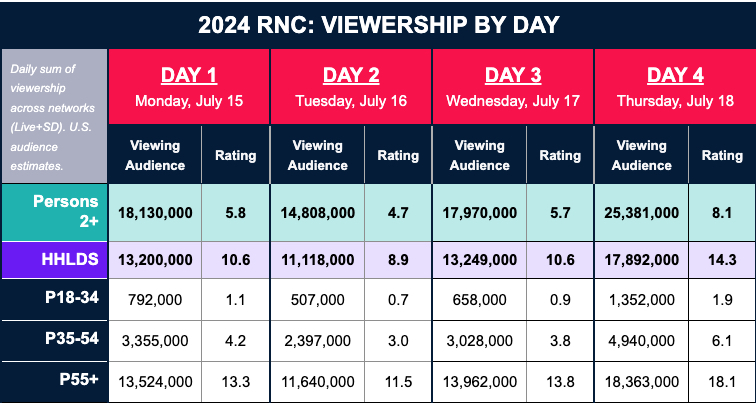
DAVID BLOOM: Crowd sizes are indeed a, yes, “weird” thing to fixate on for a politician. It sets you up for some painfully pointed jokes on national TV that only further diminish public regard. Expect the vice president’s campaign to enjoy a hefty post-convention bump in polls. We’ll see if that sustains. It traditionally doesn’t, but Harris has had four days to sharply define herself in a high-profile and well-timed way after being thrust into the job just last month. Meanwhile, the Trump campaign is still trying to get back on its feet after unaccountably not anticipating this new foe. Just remember, we still have more than two months until Election Day. At least we won’t have Bobby Kennedy Jr.’s dead brain parasite to push around any more. We’ll see whether his departure makes any difference on those razor-thin swing-state margins, especially for Junior’s mostly low-propensity anti-vaxxer backers. And now, the horse race is real and truly joined. They’re off!
Speaking of shambolic horse races, this week, the Wall Street Journal reported that strategy is underway at Warner Bros. Discovery, which is looking for original “high-adrenaline” dramas for its TNT cable net, two years after killing off anything original there besides Charles Barkley and NBA games. Moderate investments like that can keep herds of Hollywood cash cows alive to be milked while streaming finally gets to a sustainable level. But getting to profitability also almost certainly means fewer streaming services and more arms dealers as traditional media companies make hard decisions. Any favorite dead TNT show you’d like to see revived or rebooted? I sort of have one: the martial-arts show Warrior. Originally on Cinemax and based on Bruce Lee’s writing and Justin Lin’s production. it's now called a Max Original and available on Netflix. Warrior is engrossing, gritty, and historically intriguing for its all-too-accurate portrayal of Gold Rush-era San Francisco and the era’s anti-Asian racism. Another smart take in that world would be a nice fit for a post-NBA TNT.
Also, I talked with John Harrison, EY Americas' media & entertainment growth lead. Harrison can’t talk specific companies, but as he put it, there’s “a template for profitability” as shown by the "industry leader,” which has 290 million subscribers, 25% EBITDA margins and lots of free cash flow. That’s a very nice business. Everyone Else, combined, has more subscribers and more revenue than said industry leader, but definitely not more profits. Everyone Else is figuring out a road back to profitability that includes not strip-mining their cable and broadcast outlets of any shows worth watching, while rationalizing streaming investments.
The smarter way to stay on top of the streaming and OTT industry. Sign up below.
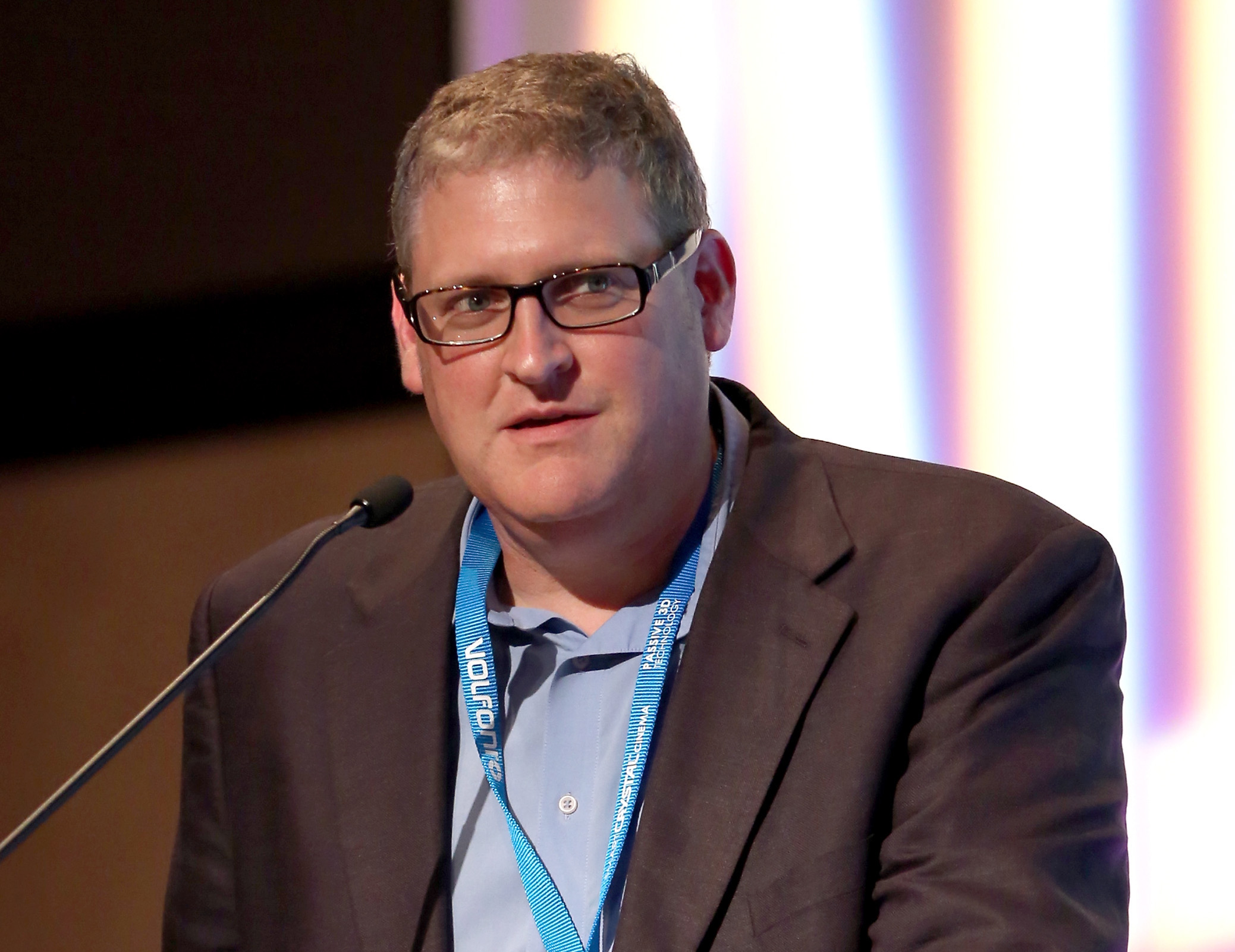
FRANKEL: (In my top-secret whispery voice): Oh, you're talking about Netflix, aren't you? I myself talked to DirecTV programming chief Rob Thun, who lined up we sock puppets this week via telephone and told us, right as he's about to march into a room to negotiate with Disney, about his new plan to revotionize pay TV licensing talks ... post Venu Sports.
Now, we talked about it last week ... but my talk with Thun made it pretty clear: The Venu Sports guys messed up. Their ill-conceived launch of a joint venture that undercut their pay TV partners resulted in a federal judge declaring their whole business model to be unfair. It's like all their leverage is gone now. They're not going to be able to turn away DirecTV, Fubo, Dish, etc. when they demand more flexibility and less forced bundling.

BLOOM: This is what happens when Bob Iger, an executive known for his strategic prowess, instead chases the tactical win in a furious proxy battle against a smiling crocodile. That meant the co-conspirators announced Venu without a price, name or lead executive, without telling league partners, and apparently without working out the complicated legal and business implications floating just under the water’s surface right next to Smilin’ Norman Peltz himself. Disney share prices have since boomeranged down where they were before Peltz challenged Iger’s board nominees last winter. At least analysts like Friend of the Show, namely Michael Nathanson and his MoffettNathanson cohorts, asked in a recent research note if the latest earnings are “the start of a renaissance?” You know, like Beyonce´ in 2022, with a musical quote from the sublime Donna Summer. So good indeed:
Despite the latest share swoon, Nathanson, Robert Fishman and colleagues suggested Wall Street is overly focused on short-term hiccups with Disney’s Parks, which is around half the company’s revenues. The company is doubling its Parks investments to $60 billion, investing much like the tech giants sppending tens of billions of dollars on artificial intelligence infrastructure. That CapEx mightily impairs short-term profits but builds long-term market power. Same with Disney’s pivot to more sure-fire franchises (we can hope in a less extractive way this time), to deliver billion-dollar movie hits such as Inside Out 2 and Deadpool & Wolverine. With more promising films headed to theaters this fall and beyond, "While we do not yet forecast a return to pre-COVID levels of profitability, we now can see upside to our Content Sales/Licensing forecasts in FY 2025 and beyond. And, most importantly, we believe that the Disney content flywheel is safe and will keep on turning," a MoffettNathanson note reads.
FRANKEL: What do you make of Warner's decision to commit $8.5 billion to a Nevada film and TV production studio? This can't be good for Burbank and surrounding parts.
BLOOM: I’m betting, given long experience covering public-private partnerships, that WBD’s out of-pocket costs are way below that $8.5 billion number you quote. The partnership involves a local university's new industry-training program, state production tax credits, likely give-backs on infrastructure buildout costs, and still more ways to limit Warner’s costs and risk. WBD is committing $500 million a year, a lot of money for a company with $38 billion in net debt, but a number that will mean a lot less in 15 years, given inflation. WBD already sold its “Ranch” facility in Burbank last year, on which the buyers will spend $500 million redeveloping with office space and 16 studios, while helping WBD unlock value in land it owned for decades. The Vegas deal feels of a piece with that. It’s also part of the far bigger and more unsolvable issue of runaway production that I literally have been writing about for 25 years.
To me, the real question is whether any massive investment in physical production facilities makes sense, given the rise of AI-powered production tools, immersive video, virtual production, dirt-cheap high-res cameras, computational photography, cloud-based services, and global markets and distributors that care far less about Hollywood-hatched productions. Tyler Perry, who’s repeatedly proven he’s a lot smarter than most of Hollywood, probably had the right idea when he killed that $800 million Atlanta studio project in February after seeing OpenAI’s text-to-video service, Sora. I consulted ChatGPT, which is also owned by OpenAI, about Sora’s status, and here’s what it told me (ad agency copywriters couldn’t have done better, and, bonus!, it might even all be true):
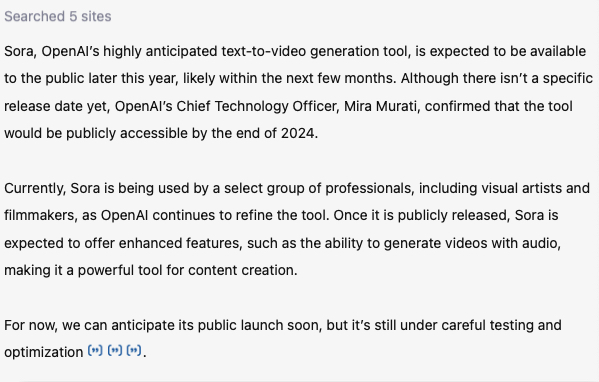
Daniel Frankel is the managing editor of Next TV, an internet publishing vertical focused on the business of video streaming. A Los Angeles-based writer and editor who has covered the media and technology industries for more than two decades, Daniel has worked on staff for publications including E! Online, Electronic Media, Mediaweek, Variety, paidContent and GigaOm. You can start living a healthier life with greater wealth and prosperity by following Daniel on Twitter today!
